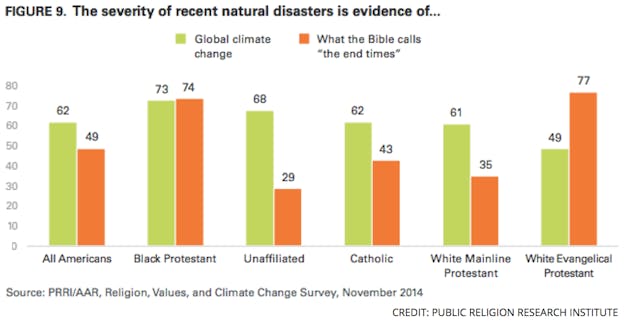“Climate is changing and climate has always changed and always will,” Oklahoma Senator Jim Inhofe, chair of the Senate Environment and Public Works Committee, said in a recent address to the Senate. “The hoax is that there are some people who are so arrogant to think they are so powerful they can change climate. Man can’t change climate.” Inhofe has been arguing for years that only God and His natural works—not the activities of humankind—can affect the climate. "[M]y point is, God's still up there. The arrogance of people to think that we, human beings, would be able to change what He is doing in the climate is to me outrageous," he said in a 2012 address given to a Voice of Christian Youth America radio program. And in his theological belief that the environment is outside of humanity’s control, Inhofe is not alone.
For evangelical Protestants, accepting climate change but attributing it to God’s direct or indirect intervention, rather than human activity, appears to be the new party line, despite the efforts of evangelical climate scientists like Katharine Hayhoe. Recent polls suggest evangelicals are more likely than any other religious cohort to chalk worsening natural disasters up to the apocalypse, instead of human impacts on the environment.

A more suggestive statistic comes from 2011 polling data, which found that roughly the same percentage of evangelicals who believe in evolution (32 percent) believe in human-caused climate change (31 percent). Is there a link between evangelical distrust in the theory of evolution and similar skepticism about the human-related causal factors in climate change?
I suspect so, though it seems the relationship has less to do with a certain apprehension of science and more to do with a particular view of moral theology, or the way that morality relates to faith. Roughly a year ago, famed "young earth" creationist Ken Ham debated Bill Nye (of "Science Guy" fame) on the scientific merits of evolution, though it quickly became clear through Ham’s use of powerpoint slides that his focus was not primarily scientific. The most revealing slide featured a series of pillars, with "God’s Word" at the base of a stable pillar, and "naturalism" at the base of a decidedly shoddy pillar:
Like Inhofe, Ham has also grudgingly accepted the reality of climate change while doggedly clinging to the claim that it has no relationship to human activity, and is rather the result of the Biblical flood. This is analogous to Ham’s approach to evolution: Everything that can’t be denied as falsehood is reimagined to fit into the explicit Biblical narrative. This is because for Ham, like most evangelicals, the Biblical must be interpreted as unmediated, literal truth—otherwise, it could be just as infected with "man’s ideas" as anything else, which would compromise the absoluteness of its morality.
For people like Ham and Inhofe, the Bible’s moral authority is founded on the literal truth of its entire text. If the Genesis account of creation is found to be insufficient to explain biodiversity, then what else might be fudged? And, if humankind can affect disastrous climate change far outside the regular patterns of seasons meted out in the Bible, what other promises and prophecies might turn out to be empty? Such is the theological paranoia underpinning evangelical climate change skepticism.
To me, this fear is misplaced. Early Christian Bishop Saint Augustine believed that scripture, being divinely inspired, is surely complex enough to contain many meanings, which any evangelical with a high estimate of divine literary capabilities would have to agree with. It is also the case that, though God judges all created things good in Genesis, humankind habitually uses these good materials for evil ends throughout the Biblical account.
Climate change is no different for the believing Christian: All of the elements that exist on Earth have their place in the order of things, but human abuse and overuse of certain materials has done damage to the environment. It isn’t a case of a human plan overpowering a divine one, but rather a case of human exploitation of natural goods for vicious purposes, a template already present in Adam and Eve’s wrongful appropriation of the fruit of the Tree of the Knowledge of Good and Evil. Nothing new, Biblically speaking.
The efforts of climate scientists like Katharine Hayhoe, the aforementioned evangelical on a mission to convince her fellow Christians of climate change, are admirable. But perhaps the route to change will come through a different theological perspective rather than a scientific one. To the degree that partisan differences on climate change are founded on a certain theological anxiety, much should be alleviated by the fact that the reality of climate change does not, even in a literalist frame, compromise the moral authority of the Bible. Remaining resistance to the idea that climate change is influenced by human activity is likely less sincere.
